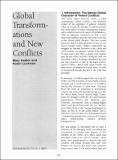| dc.contributor.author | Kaldor, Mary | en |
| dc.contributor.author | Luckham, Robin | en |
| dc.date.accessioned | 2016-02-01T14:01:29Z | |
| dc.date.available | 2016-02-01T14:01:29Z | |
| dc.date.issued | 01/04/2001 | en |
| dc.identifier.citation | Kaldor, M. and Luckham, R. (2001) Global Transformations and New Conflicts. IDS Bulletin 32(2): 48-69 | en |
| dc.identifier.issn | 1759-5436 | en |
| dc.identifier.uri | https://opendocs.ids.ac.uk/opendocs/handle/20.500.12413/8762 | |
| dc.description.abstract | Summaries The central argument of this article is that a central feature of post?Cold War conflicts has been the delegitimisation of public authority, interacting with globalisation, through a process which is almost the reverse of state and nation?building. The political economy of the ‘new wars’ involves a mix of state and non?state, national and international violence. It creates vicious cycles, reinforcing the decline in the formal sector, breaking down the distinction between public and private spheres, and mobilising identity cleavages through strategies of fear and hate directed against civilians. These vicious cycles can only be broken by peace strategies, whose centrepiece, over the longer run, is the restoration of legitimate authority and the democratisation of politics. These strategies cannot, in a world in which the state has been eroded, be confined just to the state, but must also involve many other layers of political authority, from the local to the global. | en |
| dc.format.extent | 22 | en |
| dc.publisher | Institute of Development Studies | en |
| dc.relation.ispartofseries | IDS Bulletin Vol. 32 Nos. 2 | en |
| dc.rights.uri | http://www.ids.ac.uk/files/dmfile/IDSOpenDocsStandardTermsOfUse.pdf | en |
| dc.title | Global Transformations and New Conflicts | en |
| dc.type | Article | en |
| dc.rights.holder | © 2001 Institue of Development Studies | en |
| dc.identifier.doi | 10.1111/j.1759-5436.2001.mp32002005.x | en |

